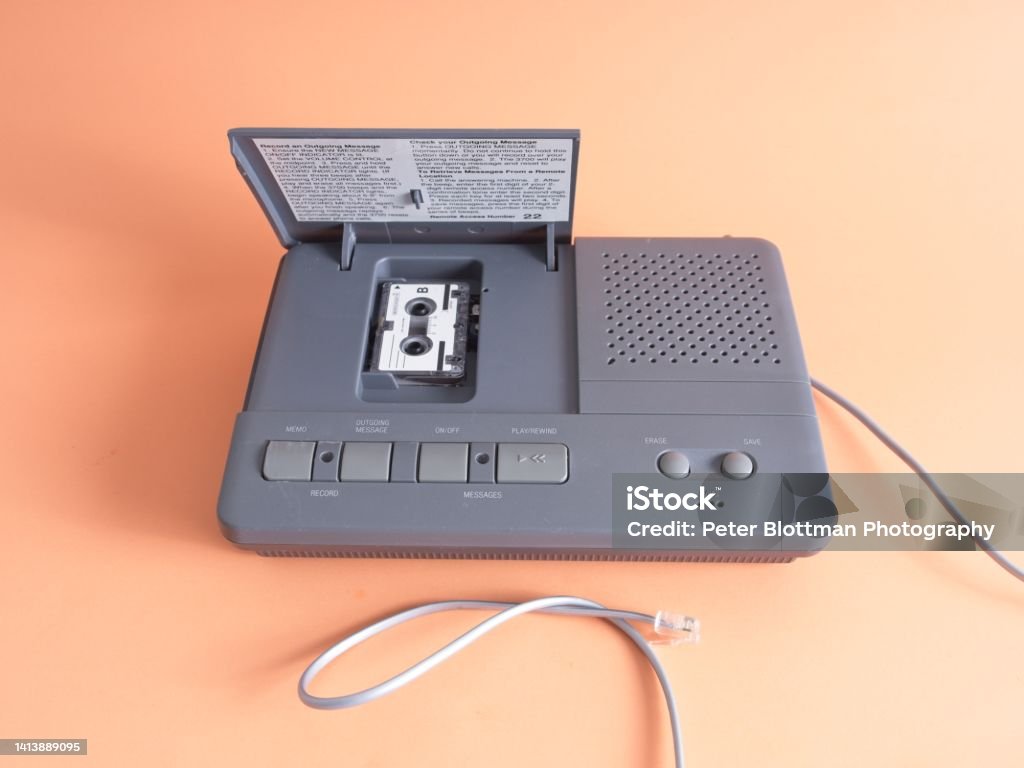What Is an Answering Machine?
An answering machine is an electronic device that records messages from callers when the recipient is unavailable. Do Businesses Have Answering Machines or Voicemails? Come along as we answer this question in today’s article. Historically, businesses relied on answering machines as a way to capture messages when employees were out of the office or unavailable to take calls. These devices recorded incoming messages onto tapes, which were later reviewed by the business owner or staff.

Although answering machines were once the go-to solution for small businesses, they have largely been replaced by digital voicemail systems. However, they are still used in some businesses that haven’t yet adopted modern solutions.
For more insights into answering machines, you can visit History of Answering Machines.
What Is Voicemail?
Voicemail is a digital system that records and stores messages for businesses. Unlike the physical answering machines of the past, voicemail systems store recordings digitally, allowing businesses to retrieve messages with greater ease. Many businesses have switched to voicemail as their primary means of capturing customer messages when employees are unavailable. This system is often integrated with modern phone systems, enabling businesses to manage voicemail remotely via smartphones or computers.
Explore more about voicemail systems on How Voicemail Works.
Why Do Businesses Use Answering Machines or Voicemail?
- Ensuring 24/7 Availability
In today’s fast-paced world, customers expect to be able to reach businesses at any time. While no one can be available 24/7, having an answering machine or voicemail ensures that your customers can still leave messages even when your staff is unavailable. Whether it’s after hours, weekends, or during busy periods, these systems provide customers with the ability to reach out at their convenience. - Managing Customer Expectations
Let’s face it – no one enjoys waiting on hold or having to call multiple times just to speak to someone. Voicemail provides a reliable method for customers to leave messages. In return, businesses can manage customer expectations by responding to messages promptly, which helps maintain strong customer satisfaction.
Check out more on customer service expectations with Customer Service Tips.
Types of Voicemail Systems Used in Businesses
- Traditional Voicemail Systems: These older systems are tied to landline phones and offer basic features such as recording a message when a call isn’t answered. Traditional voicemail is often less flexible than newer systems, but it remains a simple, effective tool for small businesses.
- Digital Voicemail Systems: These voicemail systems store messages digitally, meaning there is no need for tapes. They often offer clearer sound quality and can be accessed remotely. Many modern systems allow businesses to listen to messages on their computer or mobile phone, increasing convenience and flexibility.
- Cloud-Based Voicemail Systems: As businesses continue to move towards digital solutions, cloud voicemail systems have emerged as a flexible and scalable alternative. These systems store voicemail messages online, making them accessible from anywhere. They’re especially popular among larger businesses and those with remote or hybrid teams.
For more information on cloud voicemail solutions, check out Cloud-based Voicemail Solutions.
Voicemail vs. Live Reception: Which Is Better for Businesses?
When it comes to communicating with customers, businesses have a choice between using voicemail or live receptionists. Each approach has its advantages.
- Live Reception: Having a live receptionist ensures customers are greeted personally, which can be crucial for maintaining a high level of customer service. However, staffing live receptionists 24/7 can be costly and may not always be feasible for small businesses.
- Voicemail: Voicemail is an efficient and cost-effective solution for businesses that need to manage a high volume of calls. It allows customers to leave detailed messages, which can be reviewed and returned at a later time. Voicemail systems also provide businesses with flexibility, as they don’t need to rely on an employee being available at all times.
For businesses considering live receptionist services, read more at Virtual Receptionists Services.

How Businesses Can Make the Most Out of Voicemail
- Best Practices for Voicemail Management: To effectively manage voicemail, businesses should regularly check messages and respond promptly. Using a well-organized system that sorts messages based on urgency can help ensure that important calls are prioritized. Additionally, voicemail boxes should be reviewed periodically to keep track of messages that may need to be addressed.
- Professional Greetings: A professional voicemail greeting is essential for creating a positive impression. Ensure that your greeting is clear and concise, stating the business name, hours of operation, and providing instructions for leaving a message. A professional greeting reassures customers that their message will be handled promptly.
- Customizing Voicemail for Different Departments: For larger businesses with multiple departments, it’s a good idea to set up separate voicemail boxes for different teams (sales, customer service, technical support). This ensures that each department handles messages relevant to their work, improving response times.
Learn more about voicemail management and best practices at Voicemail Management Tips.
Common Mistakes Businesses Make with Voicemail and Answering Machines
While voicemail systems are essential for managing customer interactions, businesses sometimes make errors that can hinder their effectiveness:
- Long, Unprofessional Greetings: A voicemail greeting should be short, professional, and to the point. Lengthy or unprofessional greetings may frustrate callers, leading them to hang up before leaving a message.
- Failure to Check Messages Regularly: Not checking voicemail messages regularly is a major mistake. Messages that go unchecked for days can lead to missed opportunities and decreased customer satisfaction.
Alternatives to Traditional Voicemail and Answering Machines
Although voicemail and answering machines are still widely used, businesses are increasingly turning to more advanced alternatives. These alternatives offer more immediate communication and often provide better customer experiences.
- Live Chat and Chatbots: Many businesses now use live chat or AI-powered chatbots to handle customer inquiries. These solutions provide instant responses and can be available 24/7. Chatbots are particularly popular for answering common questions, which can save time for both customers and businesses.
- Automated Response Systems: Automated response systems, such as Interactive Voice Response (IVR), help businesses manage large volumes of calls by directing customers to the appropriate department or providing pre-recorded answers to frequently asked questions.
To explore chatbot integration, visit Chatbot Advantages.
Legal Considerations for Businesses Using Voicemail
Businesses that use voicemail systems should be aware of various legal considerations:
- Data Privacy Laws: Voicemail messages often contain sensitive information, so it’s important to ensure that these messages are stored securely. Compliance with data protection laws such as GDPR (General Data Protection Regulation) is essential, especially when dealing with personal data.
- Recording Laws: In some regions, recording calls without consent may be illegal. Businesses should inform customers if they are being recorded, and ensure they are in compliance with local recording laws.
For more information about legal compliance, visit Voicemail Legal Considerations.
FAQs
- What is the difference between voicemail and an answering machine?
Voicemail is a digital system integrated into business phone lines, while answering machines are standalone devices that record messages on tapes. - Are voicemail systems still relevant in today’s business world?
Yes, voicemail systems remain a crucial part of business operations, especially for managing after-hours calls. - How can businesses improve their voicemail greetings?
Keep greetings short, professional, and clear. Include essential information like business hours and instructions for leaving a message. - What are the alternatives to voicemail for businesses?
Alternatives include live chat, automated response systems, and chatbots that provide instant customer service. - Can voicemail messages be transcribed?
Yes, many modern voicemail systems can transcribe messages and send them to your email, allowing for easier management.
Conclusion
In conclusion, voicemail and answering machines continue to be valuable tools for businesses to stay connected with customers. Whether you opt for a traditional voicemail system, a cloud-based solution, or something in between, these systems provide a crucial way for businesses to capture customer inquiries when direct communication isn’t possible. While live receptionists remain a great option for many businesses, voicemail offers a cost-effective and reliable alternative that ensures every customer interaction is captured.



